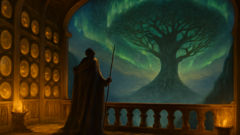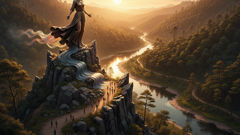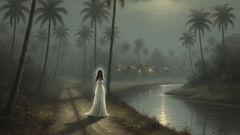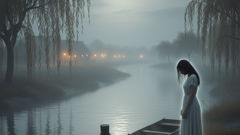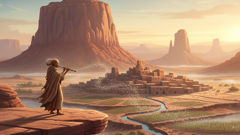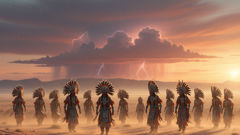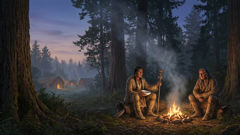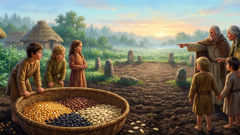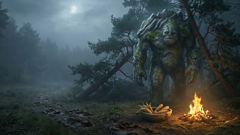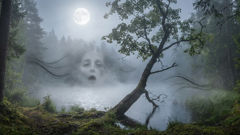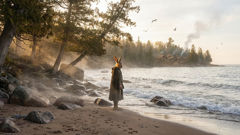Introduction
The winds that sweep over Iceland’s jagged coasts and green valleys carry whispers older than stone, stories etched into the bones of the land and murmured beneath the northern lights. In a time when fjords glimmered with the promise of new worlds and gods walked among mortals, wisdom was not a simple gift—it was a quest, a struggle, a price paid in blood and memory. The Prose Edda, as woven centuries ago by Snorri Sturluson, is more than a compendium of gods and monsters; it’s a living current that binds together tales of creation, loss, cunning, and the unquenchable thirst for knowledge. Our saga opens in a twilight world suspended between legend and truth, where Odin Allfather, restless in his hall of Valhalla, broods over the coming of Ragnarok. The world-tree Yggdrasil stands tall, its roots drinking from wells of wisdom and chaos, while mortals in windswept villages craft their own fates beneath the gaze of ancient runes. Into this tapestry steps Elin, a young skald whose verses possess a strange power—one that may tip the balance between gods and men. But the runes are restless, the old magic stirring, and even the gods cannot foresee the full cost of knowledge. As the northern sky shimmers with auroras, Elin’s journey will carry her from smoky halls to the shadowy edges of the Nine Worlds, where riddles are answered only with sacrifice and the destiny of all creation hangs by a thread. The saga you are about to enter is born from the spirit of the Edda, spun anew for those who listen to the whisper of the runes.
I. The Skald’s Oath
In the village of Hraunholt, dawn broke with a hush that felt both sacred and foreboding. The snow still clung to the thatched rooftops, but in the smoky warmth of the longhouse, Elin sat cross-legged by the hearth, her fingers trailing the carved bone of her lyre. Outside, the silver-blue light crept across the fjord, and in that first glimmer of day, the old tales felt closer than ever. Elin was no ordinary girl. She was the daughter of a fisherman and a healer, her eyes as bright as the aurora, her voice carrying a timbre that made the chieftain pause and children hush their play. For years, she’d felt the weight of something stirring—a presence in the runes she learned at her mother’s knee, a rhythm in the sagas that danced at the edge of waking dreams.
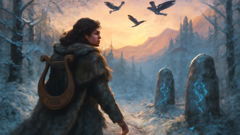
The village chieftain, Arnor, summoned her as the night’s feast waned. He’d heard rumors: the gods’ patience grew thin, omens flickered in the skies, and the runes etched into ancient stones pulsed with an unearthly light. Elin’s gift, he believed, was the thread that might bind Hraunholt’s fate to something grander. In the firelight, before the assembled kinfolk, Elin was given a task: travel to the hallowed well of Urd, where the Norns wove destinies, and return with the knowledge to save her people from the shadow creeping down from the north. She accepted, voice unwavering. But as she spoke her oath, a sudden gust flickered the flames, and a shiver swept the hall. Outside, above the snowy pines, a raven’s silhouette passed against the moon.
She left before sunrise, carrying only her lyre, a sack of provisions, and a fragment of carved oak—her father’s keepsake, marked with runes of protection. The world outside Hraunholt was larger, colder, more mysterious than any saga could capture. Elin’s path wound past frozen waterfalls, through forests where wolves howled and mist curled around ancient standing stones. Each night she sang to the runes, coaxing warmth from her lyre. Sometimes, her music brought strange dreams: visions of a one-eyed man standing beneath a vast ash tree, listening as the world quaked. At every step, she felt watched—by gods or by fate, she could not tell.
In the shadow of Mount Hekla, Elin met her first trial. The snows deepened, the sky darkened, and the wind howled as if possessed. Huddling beneath a gnarled pine, she was startled by the sound of antlers clashing—two reindeer locked in battle, their breath steaming, eyes wild. As she watched, a figure stepped from the swirling snow: a tall woman draped in grey, eyes like chips of ice. The woman spoke in a voice like breaking branches: “Why do you trespass in the wild, skald-child?” Elin swallowed her fear. She sang her purpose—a verse woven with courage and longing. The woman listened, then pressed a rune-carved stone into Elin’s palm. “Speak true at Urd’s Well, or all will be lost.” Then she vanished, leaving only tracks that filled with snow almost instantly.
Elin pressed on, guided by dreams and omens. The land itself seemed to respond to her quest—trees whispered her name, rivers gleamed brighter where she drank, and ravens gathered, sometimes leaving black feathers at her feet. The journey to Urd’s Well was not only a test of endurance, but of trust: each night, she repeated her oath, unsure if the gods listened or if her own heart was strong enough to face what lay ahead.
II. Urd’s Well: Threads of Fate
By the time Elin glimpsed Urd’s Well, she was half-mad with exhaustion and awe. The sacred spring lay hidden in a grove of twisted yew trees whose roots gripped the earth like the hands of ancient giants. Silver mist curled above the water’s surface, shimmering with flecks of light that hinted at other worlds. At the edge of the pool, three figures awaited: the Norns—Urd, Verdandi, and Skuld—spinners of fate, guardians of all destinies from the birth of gods to the fall of men.
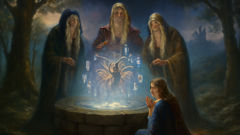
Elin approached, her heart pounding with reverence and fear. The Norns’ eyes held lifetimes, their hair streaked with white and gold and midnight black. Urd spoke first: “Why do you seek what even gods fear to know?” Elin knelt and sang her journey—of her village’s plight, her oath, the gift from the woman in the snow. As her voice trailed off, the Norns listened, then beckoned her closer. Verdandi dipped a finger into the well and drew forth a single shining thread. “The wisdom you seek is not given, but earned,” she intoned. “To save your kin, you must unmask the riddle that binds gods and mortals alike.”
They bade her gaze into the well’s depths. Elin saw visions swirling in the water: Odin hanging from Yggdrasil’s branches, sacrificing himself to learn the runes; Loki in chains, writhing as venom dripped on his brow; mortals lost in endless winter; and, behind it all, a shadow twisting through the Nine Worlds. The runes on her father’s keepsake grew warm in her palm. Skuld, youngest of the Norns, leaned in: “There is one who knows the path—Odin himself. But to reach him, you must cross Bifröst, the rainbow bridge, and face what waits in the world of gods.”
The Norns gave her a blessing—a thread from the well, glimmering with ancient power—and vanished into mist. Elin awoke at dawn with dew on her brow and new resolve in her heart. As she turned away from the well, she noticed runes had formed in frost along her arm. They shimmered faintly, echoing with hidden meanings that slipped away whenever she tried to focus. She pressed on, seeking Bifröst, her every step echoing with the unyielding rhythm of fate.
Her journey carried her across wide valleys and frozen rivers. In a clearing lit by winter sun, she met a wanderer—an old man, cloaked and hooded, with one eye hidden by a shadow. He spoke in riddles and laughter, teaching her verses that seemed to unlock the meanings behind her new runes. Elin suspected who he was, but dared not ask. Before parting, he placed a raven feather in her hand and whispered, “All knowledge comes at a cost, skald. Remember your song.”
At last, Elin reached the edge of Bifröst: a bridge of light arching from the earth into a sky swirling with colors. Its surface rippled like a river of fire and ice. She stepped onto the bridge, feeling weightless yet burdened by all she’d seen. Above her, the nine worlds spun in harmony and chaos. She crossed, heart filled with hope and dread—toward Asgard and whatever wisdom Odin might share.
III. The Hall of Gods: A Bargain for Wisdom
Asgard’s golden towers glimmered above clouds, their spires catching rays that danced across the Bifröst. Elin stepped from the bridge into a world alive with song and thunder: valiant warriors feasting, goddesses weaving tapestries of fate, and ravens perched on rooftops whispering secrets. Yet, for all its splendor, Asgard vibrated with tension—rumors of Ragnarok, the end of all things, grew ever louder in silent glances and hurried prayers.
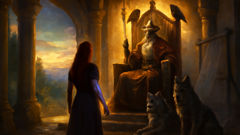
She was escorted by Heimdall, guardian of the bridge, whose piercing gaze seemed to read her soul. He led her through the great hall, past shields and banners depicting battles and betrayals. At last, Elin stood before Odin Allfather, who sat on a throne made from antler and gold, flanked by his wolves and ravens. His single eye burned with knowledge and sorrow; his presence pressed upon her like a storm.
Odin welcomed her with a nod. “Few mortals walk these halls unbidden. Speak your purpose.” Elin summoned her courage, reciting the tale of her journey, her visions at Urd’s Well, and the runes now etched on her skin. Odin listened in silence, fingers steepled beneath his chin. When she finished, he gestured for her to approach. He examined the runes on her arm, eyes narrowing. “These are the marks of sacrifice—the same that scorched my flesh when I hung upon Yggdrasil.”
He warned her: wisdom is no gentle gift. Every secret has its shadow; every truth demands a price. To gain what she sought, Elin must prove herself worthy—not by force or cleverness, but by unflinching honesty and compassion. Odin set three challenges: one in riddles, one in courage, one in mercy. Each would test not just her mind, but her spirit.
The first challenge brought her to Frigg’s garden. There, a serpent coiled around a tree, its eyes glinting with cunning. It posed a riddle of beginnings and endings, of what binds the worlds yet cannot be seen or touched. Elin pondered, recalling stories of Yggdrasil’s roots and the threads at Urd’s Well. She answered: “Hope.” The serpent smiled and let her pass.
The second challenge awaited in a shadowed courtyard where a frost giant—taller than any man, his skin shimmering like ice—blocked her way. He demanded a duel of courage. Elin knew she couldn’t match his strength. Instead, she played her lyre and sang of the battles she’d survived—the terror and the will to endure. The giant listened, tears freezing on his cheeks, and stepped aside, moved by the music that gave voice to fear yet refused to yield.
The last challenge was the hardest: in a silent room sat Loki, bound in chains that glowed with runic fire. He begged for her compassion, telling tales of regret and longing for forgiveness. Elin listened to his laments, then sang a song of sorrow and redemption. She offered him not freedom, but understanding—a gift seldom given even by gods.
Odin summoned her back. “You have done what even some gods cannot,” he said quietly. “You have faced truth and sorrow without flinching.” He granted her the wisdom she sought: how to weave runes into songs that could heal or protect, to mend what had been broken. Asgard’s shadows grew lighter for a moment, even as doom lingered on the horizon. Odin gave her a final blessing—a silver feather from Huginn, his raven of thought—and sent her back across Bifröst to the world of men.
Conclusion
Elin returned to Hraunholt beneath skies ablaze with aurora, bearing gifts both visible and unseen. The runes on her arm shimmered softly as she stood before her people, her song weaving through the longhouse like dawn breaking after endless winter. She taught them verses learned from gods and giants alike—songs that healed wounds, soothed grief, and strengthened hearts. But she also spoke of the cost of wisdom: that every gift exacts its due, that every joy is laced with loss. The villagers listened, some with tears, others with awe. Over time, Elin’s legend grew. Her lyre’s notes could calm storms and wake memories from stone. Yet she never claimed power for its own sake—her greatest lesson was humility before the vastness of fate. The runes she bore faded slowly, their secrets entrusted to the next generation of skalds. In distant Asgard, Odin watched with his one wise eye, knowing that the balance between gods and men had shifted—if only by a feather’s weight. And so the saga endures: a tale born of longing and sacrifice, carried on the wind like whispers of the runes. In every echo of song or flicker of northern light, the story renews itself for those willing to seek and to listen.

